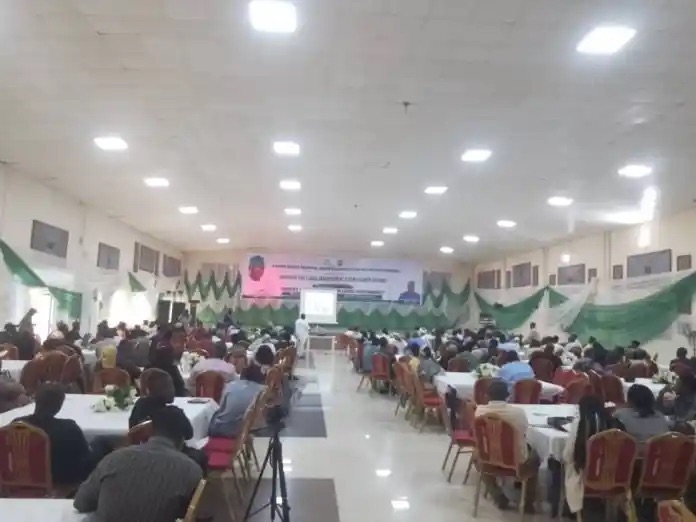The Sound Minds Medical and Rehabilitation Initiative (SOMMRI), in partnership with the Plateau State Ministry for Local Government and Chieftaincy Affairs, hosted a one-day workshop on Tuesday, September 28, 2025, in Jos to address the escalating issue of drug abuse and its devastating effects on governance, security, and community development. The event, themed “Impact of Drug Abuse on Local Governance,” took place at Crispan Events and Suites.

This Northern Zone workshop concluded a series of similar engagements previously held in Plateau’s Southern and Central zones. Participants included members of the Plateau Youth Council (PYC), traditional and religious leaders, security personnel, local government directors of health and social services, council secretaries, and community representatives.
Rising Drug Abuse Trends
Nurse Ndak Zuhumnan Andarawus, popularly known as Nurse Kizito, Program Manager of the Plateau State Malaria Eradication Project and SOMMRI volunteer, led the technical session. He highlighted alarming statistics on drug abuse in Nigeria and Plateau State, emphasizing the need for psychoeducation and community-driven interventions to dismantle drug syndicates.
“Globally, about 247 million people used drugs in 2014, with 28 million suffering from drug use disorders. In Nigeria, one in seven individuals aged 15–64 is involved in drug abuse,” Kizito revealed. He noted that after Kano, Plateau has the second-highest drug use rate in the country, with cannabis being the most abused substance.
Kizito described how most communities in Jos have areas known as “jungles” where drugs are openly consumed, contributing to insecurity and violent crimes such as armed robbery. He also highlighted health risks, including drug-induced psychosis, hallucinations, liver damage, miscarriages, and mental instability. “If stakeholders unite to end drug sales, the menace will fade. This fight must start from our homes, schools, and neighborhoods,” he urged.
Expert Analysis: Risk Factors and Solutions
Clinical Psychologist Mafai Dauboyi discussed family-related risks, including poor parenting and early exposure to alcohol, while stressing the protective role of positive role models and structured community programs.
Consultant Psychiatrist Prof. Nwoga Charles of the University of Jos provided an overview of drug classifications—stimulants, depressants, hallucinogens, and alcohol—warning of their severe effects. “Marijuana alone contains over 400 harmful substances. Substance abuse erodes health, relationships, and productivity, trapping individuals in cycles of dependence and societal decline,” he said.
Prof. Charles urged the government to establish public rehabilitation centers across Plateau, noting that private facilities cannot handle the crisis alone. He recommended early awareness programs, community-based rehabilitation, and routine drug testing for public office aspirants to safeguard governance.
Pharmacist Gyang Samuel Ishaya, Executive Secretary of Jos North Local Government Council, described the workshop as timely. “Our problem in Jos North is not ethnic or religious—it is drugs. We are losing brilliant youths, including graduates, to addiction,” he said, calling on government and traditional leaders to build on the workshop’s outcomes.
Rt. Hon. Aseno Amos, Speaker of the Plateau Youth Council, emphasized the need for continuous sensitization. “Many youths in correctional and rehabilitation centers are there because of drugs. We need more programs like this to save our future,” he noted, linking unemployment and insecurity to substance abuse.
Traditional rulers decried the widespread availability of illicit drugs and urged collaboration between local councils, security agencies, and faith-based organizations. Representatives from the Christian Association of Nigeria (CAN) and the Jama’atu Nasril Islam (JNI) highlighted the moral and spiritual dimensions of the crisis and pledged to use their platforms for prevention and rehabilitation.
Call for Policy Action and Youth Engagement
Participants recommended stronger local by-laws, increased funding and authority for the NDLEA, and stricter enforcement of existing regulations. They also called for reviving youth-focused initiatives such as debates, quizzes, and community events to engage young people constructively.
During the workshop, organizers distributed questionnaires to ensure participant feedback would inform government policy. Plans are also in motion to establish a state-owned rehabilitation and prevention center to tackle the growing challenge.
In his closing remarks, Nurse Kizito expressed optimism that the discussions would translate into actionable recommendations for the Plateau State Government. “We cannot fold our hands while drug abuse destroys our youths and threatens governance. This workshop is just the beginning of a coordinated response,” he affirmed.

